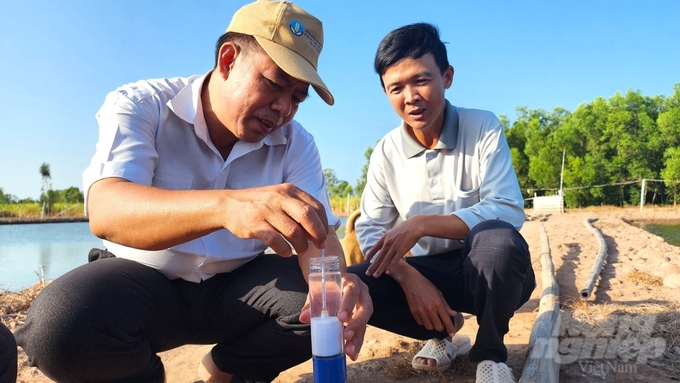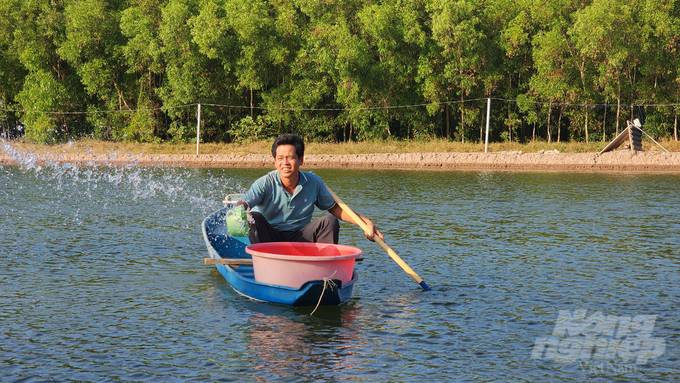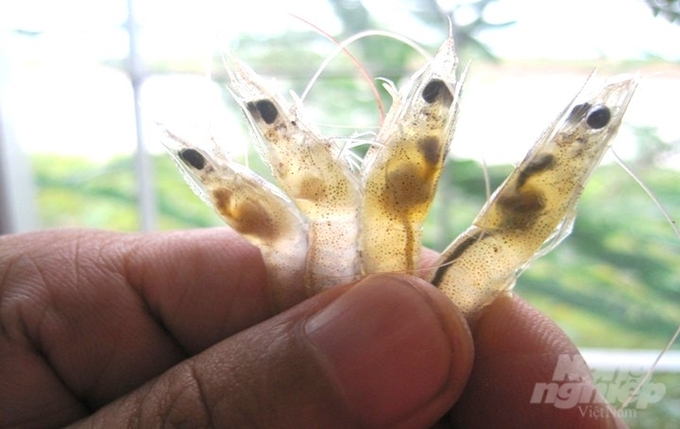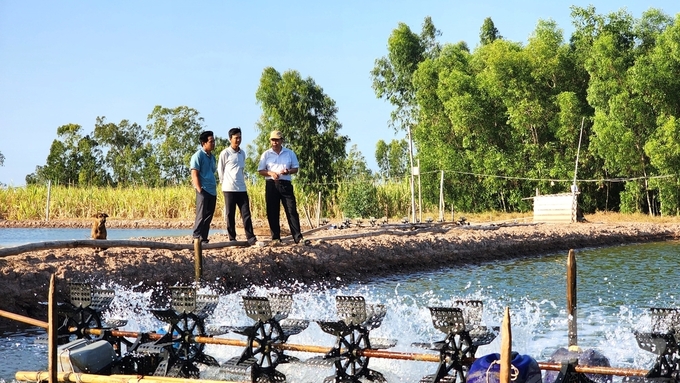June 14, 2025 | 04:06 GMT +7
June 14, 2025 | 04:06 GMT +7
Hotline: 0913.378.918
June 14, 2025 | 04:06 GMT +7
Hotline: 0913.378.918

Soc Trang Sub-Department of Livestock Production and Animal Health testing the concentration of saline water in shrimp ponds. Photo: Kim Anh.
Farmers in Soc Trang province are entering the new 2023 shrimp crop, but unfavorable weather conditions has resulted in disease risks on farmed shrimp.
According to the Soc Trang Sub-Department of Livestock Production and Animal Health, the day-night temperature difference is substantial: the day is hot whereas the night and morning is cold, foggy; so farmers are concerned about disease risks on shrimp.
Additionally, several farming areas in My Xuyen district and Vinh Chau town have recorded a salinity of below one per thousand which is not suitable for stocking shrimp seed. According to experts, this is the slowest year of salt water return compared to previous years in Soc Trang province.
Mr. Chau Thanh Nam in An Thanh 3 commune, Cu Lao Dung district, Soc Trang province, said that this is the main shrimp crop of the year for most farmers. However, some shrimp areas seeded since June 2022 are currently experiencing diseases, most of the shrimp suffer from slow growth. Mr. Nam assessed that farmed shrimp are especially sensitive to the weather, if the weather changes unexpectedly during the farming process, the shrimp's eating speed will stall; so he is hesitant to start a shrimp crop.

Shrimp farmers in Soc Trang province treating pond water while waiting for favorable weather to stock the main 2023 shrimp crop. Photo: Kim Anh.
Mr. Nam shared that his family was greatly troubled by the red body disease on farmed shrimp a few years ago. The disease spread from an infected pond to the entire farming area, causing a near 100% loss.
Drawing from that experience, Mr. Nam pays special attention to weather factors before stocking shrimp. With the current extreme weather and late arrival of salinity, Mr. Nam chooses to continue renovating and drying the pond.
Moreover, he performs cleaning, disinfecting, liming to stabilize the pond water environment before stocking to prevent diseases on farmed shrimp.
At Hung Phu Fisheries Cooperative, Cu Lao Dung district, the area of shrimp seeding of the cooperative's members has only reached 50% so far, which is equivalent to roughly 50 hectares. Mr. Lam Thanh Lam, Deputy Director, said that this year's crop has been cold, and the area of shrimp cultured by members of the cooperative is suffering from red body and white spot disease. In addition, some small areas reported cases of intestinal diseases, white feces, acute hepatopancreatic necrosis; the disease rate accounted for 10-20% of the farming area.
Subsequently, the cooperative has coordinated with Soc Trang Sub-Department of Livestock Production and Animal Health to promote and recommend cooperative members to stock shrimp according to the seasonal schedule, select quality seed sources, pay special attention to environmental factors during the management stage to partially limit the risk of disease. For areas where shrimp have been stocked, members of the cooperative need to keep the water level between 1.4 and 1.6m for a stable temperature environment as well as enhance minerals and vitamins for shrimp, namely vitamin C to increase resistance for shrimp.

Shrimp farming areas in Soc Trang are currently facing 3 common diseases on shrimp: white spot (WSSV), early mortality syndrome (EMS) and Enterocytozoon hepatopenaei (EHP). Photo: Kim Anh.
Mr. Dao Van Bay, Deputy Director of Soc Trang Sub-Department of Livestock Production and Animal Health, reported that, shrimp farming areas in the province are currently facing three common diseases on farmed shrimp: white spot (WSSV), early mortality syndrome (EMS) and Enterocytozoon hepatopenaei (EHP). The EHP epidemic has been on a steady rise in recent years; farmers have had disease prevention procedures but they have not been effective.
Mr. Bay believes that one of the contributing factors to diseases in farmed shrimp is the constantly degrading conditions of the farming environment. Furthermore, the quality of water for aquaculture is increasingly polluted because the irrigation system was originally designed for rice production. In addition, diseases have circulated in intensive farming areas for many years, leading to an increased risk of disease damage.
Mr. Bay emphasized, in order to closely and proactively manage disease prevention and timely response to shrimp diseases, the Sub-Department has implemented disease surveillance programs in brackish water shrimp areas since the beginning of 2023. Accordingly, monitoring samples have been collected at 20 points across the canals, at a frequency of 2 times per month to promptly detect diseases in the environment and make recommendations to the farmers.

Soc Trang Sub-Department of Livestock Production and Animal Health recommends farmers to stock shrimp according to the seasonal schedule, select quality seed sources, pay special attention to environmental factors during the management stage to partially limit the risk of disease. Photo: Kim Anh.
Regarding disease surveillance on shrimp seed, the Sub-Department also conducts weekly random sampling at nursery facilities in the province to test for common diseases in shrimp. On the other hand, disease surveillance was also conducted in farming areas and on commercial shrimp at export businesses.
When samples are tested positive for diseases, Soc Trang Sub-Department of Livestock Production and Animal Health will distribute chemicals for treatment. The Sub-Department has reserved over 41 tons of chlorine chemicals for 4 key shrimp farming districts in the province to prevent diseases in 2022.
As of March 9, 2023, the brackish water shrimp farming area in Soc Trang province has reached over 1,570 hectares with the damaged area accounting for 0.63% of the stocking area. The main cause of damage was reported to be white spot disease, acute hepatopancreatic necrosis, concentrating mainly in Cu Lao Dung district and Vinh Chau town.
Translated by Nguyen Hai Long

(VAN) In Tien Giang, a high-tech shrimp farm has developed a distinctive energy-saving farming model that has yielded promising results.
![Turning wind and rain into action: [3] 300.000 farmers benefit from agro-climatic bulletins](https://t.ex-cdn.com/nongnghiepmoitruong.vn/608w/files/news/2025/06/12/e5a48259d6a262fc3bb3-nongnghiep-125122.jpg)
(VAN) The agro-climatic bulletin has become a valuable tool for farmers in the Mekong Delta. After more than five years of implementation, the initiative is gradually being expanded nationwide.
![Turning wind and rain into action: [2] Providing forecasts to the people](https://t.ex-cdn.com/nongnghiepmoitruong.vn/608w/files/news/2025/06/12/e5a48259d6a262fc3bb3-nongnghiep-103927.jpg)
(VAN) In addition to improving the quality of hydrometeorological forecasts, putting forecast bulletins into practical use is crucial for production and disaster prevention.

(VAN) Blue carbon is receiving attention for its rapid absorption capacity and vast potential. It represents a promising nature-based solution to respond to climate change.
/2025/06/11/3507-1-161904_583.jpg)
(VAN) Seagrass beds and coral reefs serve as 'cradles' that nurture life in the ocean depths, creating rich aquatic resources in Vietnamese waters.
![Turning wind and rain into action: [1] Forecasting for farmers](https://t.ex-cdn.com/nongnghiepmoitruong.vn/608w/files/news/2025/06/11/e5a48259d6a262fc3bb3-nongnghiep-111919.jpg)
(VAN) Weather is no longer just a matter of fate. Forecasts have now become an essential companion for farmers in every crop season.
/2025/06/10/2501-3-082025_983.jpg)
(VAN) Mr. Le Hoang Minh, Head of Vinamilk's Net Zero project, recently shared insights on the integration of production, energy, and technology in Vinamilk’s green transition journey.